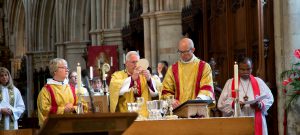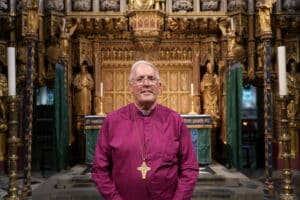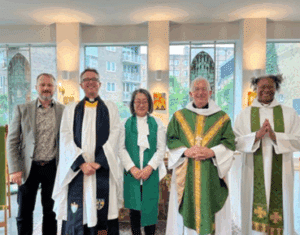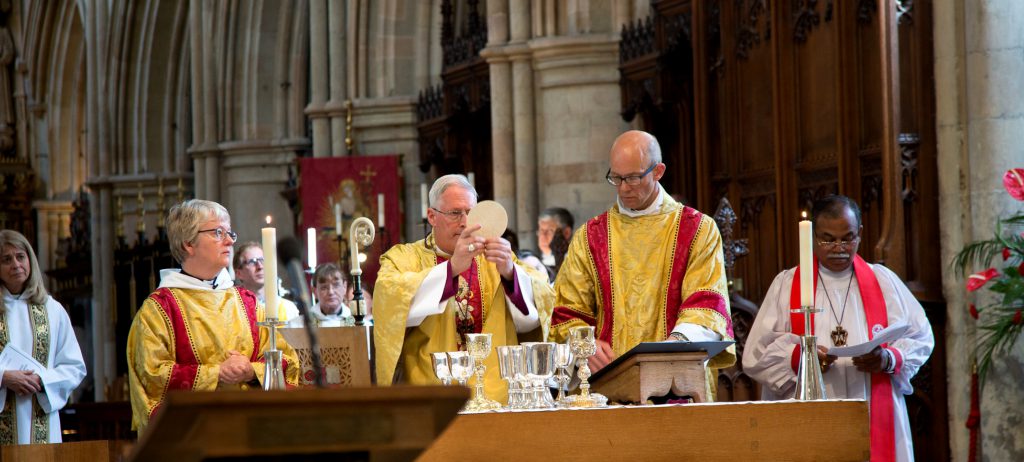Bishop Christopher has written to clergy and lay leaders across our diocese concerning the Terminally Ill Adults (End of Life) Bill, which is due to be debated int he House of Commons at the end of November 2004. The full text of Bishop Christopher’s letter is below:
Terminally Ill Adults (End of Life) Bill
Dear brothers and sisters in Christ,
I am writing to you during my convalescence in advance of a Private Members Bill which is due to be debated in the House of Commons at the end of November. The contents of the Bill have yet to be published, but its intention will require amendment of the Suicide Act 1961 to allow for medical assistance in meeting a patient’s request for death. We understand that the focus will be on the terminally ill. The Archbishop of Canterbury, the Cardinal Archbishop of Westminster, and the Chief Rabbi of the United Hebrew Congregations have made a joint declaration against the Bill. A similar Bill introduced in the House of Lords in July was opposed by a range of Christian leaders and by those of other faiths. Bishops in other dioceses have been writing to their people in similar terms.
The Bill’s promoters wish to relieve acute suffering in terminal illness. Others want provisions extended to cover chronic suffering. These are both laudable aims worthy of serious and informed discussion. For others again, this is about the autonomy of the individual and a desire to extend the realm of personal choice as end of life approaches. This too raises important philosophical and theological questions. The issues involved are hugely emotive whichever side of the debate one is on and where the topic comes up, it is beholden on us as Christians to conduct ourselves graciously and with courtesy, listening carefully to people’s stories and experience.
While individual Anglicans undoubtedly weigh matters differently, the Church of England itself does oppose assisted dying/suicide and in the General Synod has voted overwhelmingly twice against the practice in 2012 and in 2022. Additionally, as yet, little consideration has been given to the impact of assisted dying legislation on the medical profession.
My concern is two-fold. The first is that issues of life itself and of care in dying are insufficiently addressed in these debates. Palliative care (a medical approach that improves the quality of life of patients and their families who are facing problems associated with life-threatening illness) relies heavily on the charitable sector in this country. Indeed the Hospice Movement with which I have been closely associated for many years is chronically underfunded but a wonderful example of expert medical provision and loving care extended to those coming to terms with their mortality (as well as to their nearest and dearest) who are seeking ultimately a dignified dying. In Southwark we give thanks for the pioneer work in this area by Dame Cicely Saunders who founded St Christopher’s Hospice in Sydenham. Hospice UK found in 2017 that 100,000 individuals died without palliative care who would otherwise have benefitted from it. We need more investment and research in palliative medicine. We fear that an option of assisted dying will reduce this priority.
Secondly, where assisted dying/suicide has been introduced in other jurisdictions, the provisions for this have expanded over time. In Oregon, the list of illnesses which may apply now includes arthritis and diabetes, neither or which are usually terminal. Several other places include poor mental health as a reason.
I believe that it should be recognised that assisted dying will have a disproportionate effect on the most vulnerable in our society. Those who can afford high quality care and/or have caring supportive families will be less likely to consider this option. Those whose families have neglected them or who implicitly or directly pressure them for venal reasons will be vulnerable to the message that their life should end. Women are disproportionately vulnerable to coercive relationships.
In Oregon in 1998, 12% of those surveyed and availing themselves of assisted dying reported that they felt themselves to be a burden. In 2023, this figure was 43%.
Should you wish to raise these (or any other matters) with your Member of Parliament before the main debate on 29 November – and I encourage you to do so – you can do so by identifying their name and contact details here: Find MPs – MPs and Lords – UK Parliament
You may wish to express support for the Bill. Please remember if doing so, not to indicate that such a position represents the Church of England but your personal position.
Regardless of where your deliberation takes you, please commit everything to prayer and know that you are being held in prayer, not least that as you consider what it means to minister to the sick and to prepare the dying for their death, you would better know the God who accompanies us through death and into resurrection and new life.
For I am convinced that neither death, nor life, nor angels, nor rulers, nor things present, nor things to come, nor powers, nor height, nor depth, nor anything else in all creation, will be able to separate us from the love of God in Christ Jesus our Lord. (Romans 8. 38-39)
Comfort one another with these words.
May God bless you,
The Right Reverend Christopher Chessun
The Bishop of Southwark
Further resources on Assisted Dying
A guide to terminology:
Overviews of Assisted Dying:
Podcasts:
Further theological reflection:












